AI generated illustration
Some things haven’t changed since Roman times or even earlier. Take that old adage “Si vis pacem, para bellum”, which was written by the Roman general Publius Flavius Vegetius Renatus in his tract Dē Rē Mīlitārī, and is usually translated as “If you want peace, prepare for war.” It was originally written as “Igitur quī dēsīderat pācem, præparet bellum,” and its author’s name is usually given simply as Vegetius. It was true then, as it had been for centuries, and it still is today. We know he lived in the late 4th century, towards the end of the Roman empire, and that he wrote two works that are quite highly regarded, but not much more is known about him. His rules on siege craft and on the need for discipline, were studied during the Middle Ages and his work became the go-to book on military tactics in Europe. George Washington owned a copy. And, of course, he was right on the money with that famous quote, even today. It’s what underpins the EU’s policy of its European Defence Industrial Strategy, or EDIS. According to the European Commission, the European Union needs to strengthen the European Defence Technological and Industrial Base (EDTIB) and achieve industrial readiness for Europe’s defence. This is, of course, a response to Vladimir Putin’s aggressive posturing and his apparent desire for war, even if it’s a war that nobody can ever truly win.
This is the first time that the European Commission has produced a European Defence Industry Strategy and it was announced by Commission President Ursula von der Leyen during her 2023 “State of the Union” speech. This is serious stuff, setting out the vision for the European Defence Industrial Policy up to 2035, through increased and more collaborative investment by the EU’s member states. Part of the overall policy is to improve the European defence industry’s ability to respond quickly to a crisis, no matter what the circumstances or the restraints imposed by time. The policy calls for a culture of “mainstream defence readiness” across all EU plans, working together with strategic and like-minded international partners.

The EU was not, of course, ever intended to get involved in defence issues. It all began in May 1950, when Robert Schuman unveiled a French government proposal to place the coal and steel industries of the two countries under a single authority, to be known as the High Authority, “within the framework of an organisation open to the participation of the other countries of Europe” as Dirk Spierenburg and Raymond Poidevin wrote in their brilliant history of how it all began, “The History of the High Authority 0f the European Coal and Steel Community: Supranationality in Operation” (or in its original form “Histoire de la haute autorité européenne du charbon et de l’acier. Une expérience supranationale.”)
If you want to know how it all happened, this is the only book to read. I know that because back in 1994 I worked with the authors to edit it and rewrite parts. Jacques Delors, arguably the most famous ever former President of the European Commission wrote the foreword, having been approached by Spierenburg about his idea back in 1987. You may think the title makes it sound dull, but I can assure you that is not the case. Once each week, Poidevin, Spierenburg and I would meet over a beer or two (or more) in a bar near to the European Commission in Brussels. It was great fun, a fact that I think is reflected in the text. The beer, being Belgian, was pretty good, too. Both men were a real pleasure to be with, charming and erudite, with a host of fascinating anecdotes about the heady start of what would grow up to become the European Union. As Jacques Delors wrote in his foreword to the book: “Today, as Europe searches for a new identity and as more and more nations are turning to the Community, it is more essential than ever to record historical events for posterity.”

Sadly, since the UK’s idiotic decision to leave the EU, many things have been going wrong around the world. We must simply accept, I suppose, that some world leaders long to smell the smoke of battle and hear the rattle of automatic fire (as long as they’re personally far enough away to be in no direct personal danger). They are the sorts of military heroes who always prefer to lead from the rear, safely out of harm’s way. We have to remember, of course, that Europe’s working classes had been through some very tough times while their habitations and standards of living had been generally appalling. If that had not been true, the work of Karl Marx and Friedrich Engels would have been ignored and there would have been no Communist Manifesto. There would have been no Soviet Union, either, but the mistreatment of those not born to privilege would have gone on.
| NEW WAYS PATHS TO THE FUTURE
While Marx, Engels, Lenin and Trotsky were dreaming of a utopian future in which everyone would be equal (a sadly impossible state of affairs), the dreams of Robert Schuman (France’s Minister of Foreign Affairs at the time) and the French political economist, Jean Monnet (now seen as one of the founding fathers of the European Community), were focused on the more achievable goals of extending cooperation, with the idea of some sort of “pool” of resources and effort gaining ground in post-war France. It also found favour in Germany, with Chancellor Konrad Adenauer describing the idea as being necessary to “sow the seeds of broad-based international co-operation in the field of coal and steel”, a co-operation which seemed to him to be “highly desirable for Franco-German understanding.”
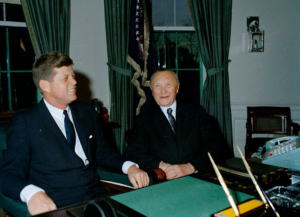
It was this shared vision, together with the stated view of several of the historians that both men admired that led them to launch what became known as the “Schuman Plan”. In the light of a decision whose effects would be revealed only over the years ahead, you will not be surprised to note that the greatest opposition to the idea came from the UK and, to a lesser extent, the Scandinavian countries. In Britain’s case, there has long been a deep-seated if totally unjustified distrust of foreigners.
And yet it was the fear of war, so soon after the end of a massive global conflict, that gave impetus to the moves towards a deeper co-operation and ultimately to the European Community (later the European Union). In the spring of 1950, with the Cold War heating up, Monnet was deeply worried, as were a great many other people, that Europe would be plunged into another war unless the problems plaguing Germany and its worried neighbours could be solved.
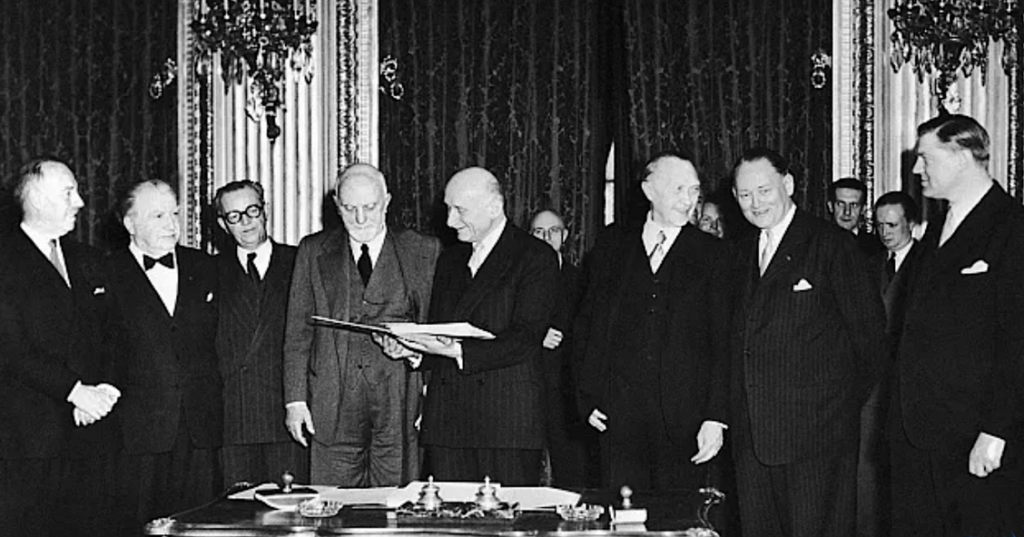
Monnet realised that the only solution was for France to overcome its fear of domination by German industry whilst also saving that industry from the discrimination born of Germany’s recent defeat. That way, Monnet believed, the necessary economic and political foundations could be laid for the sort of mutual understanding Europe so desperately needed, without a fear of another shooting war beginning. If only he’d been around when Britain left the EU! Instead, certain popular newspapers (who apparently still hate Europe for no obvious reason) inexplicably failed to point out the possible effects that leaving might have on holidays in Europe, for instance, so holidaymakers are surprised by the long queues at Dover that the Remain campaigners had predicted. One of the leave campaigners has recently claimed that leaving the EU has boosted Britain’s exports of honey. The honey industry says that’s simply untrue, but the attachment to truth was never very strong among the “Leave” campaigners and the right-wing nationalist newspapers that supported them.



| BACK IN TIME
The institutional negotiations that led to the Treaty of Paris being signed were lengthy and complicated, but in the end, they preserved the three most important principles of Monnet’s great vision. The agreement brought together his key requirements: an independence from governments and the collaboration of the main institutions, rather than having one lording it over the rest. The ECSC (European Coal and Steel Community) Treaty further established supranational law, laying down the exact rules and establishing what parts the various component bodies would play and with exactly how much power. It’s very different now.
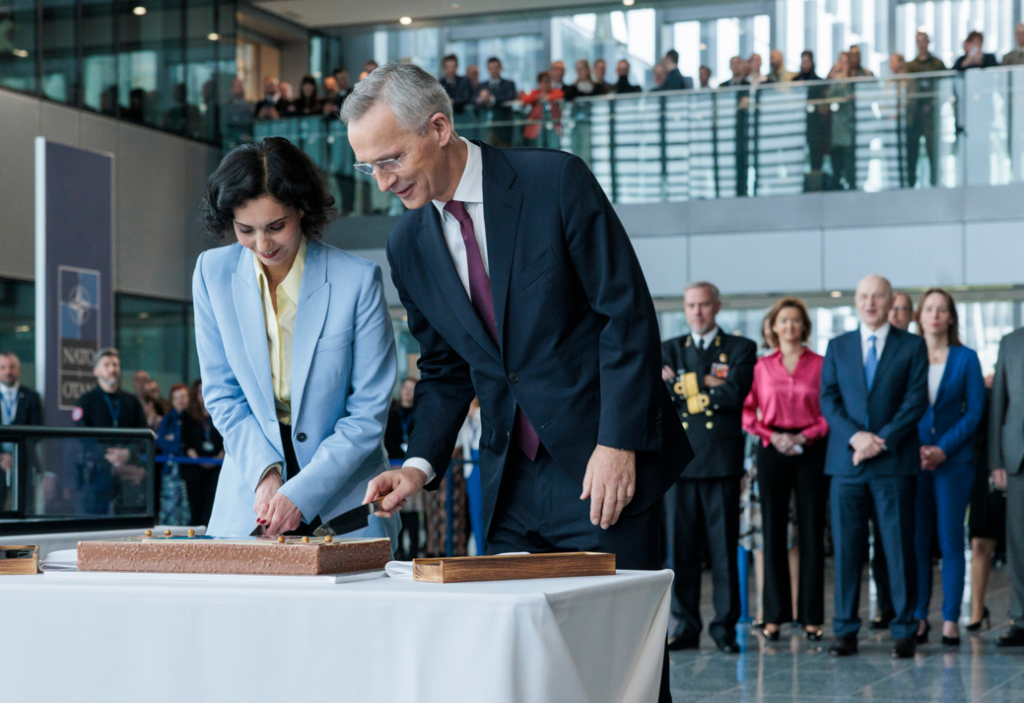
According to NATO, Russia and its allies seem firm in the belief that if they do enough bullying, they’ll get their way. When NATO marked its 75th anniversary in early April, Moscow announced that it and NATO are now in “direct confrontation”. It’s a question of differing points of view. Moscow sees NATO’s expansion as a deliberate policy to extend its borders towards Russia, while NATO says it is merely a defensive alliance and any independent country should feel free to apply for membership. Moscow is certainly opposed to Georgia and Moldova (both of them lovely countries, incidentally) having the right to do anything without Moscow’s permission. The Russian bloc’s view of independence of action is very, very different from the West’s. BBC journalist Laura Kuenssberg has warned of a change of approach on Russia’s part. The NATO chief, Jens Stoltenberg, explained it to her: “China is propping up the Russian war economy, delivering key parts to the defence industry, and in return, Moscow is mortgaging its future to Beijing.” What’s more, he warned, Russia is providing technology to Iran and North Korea in return for ammunition and military equipment. However, while Mr Stoltenberg said that military support was vital to repel Russian forces from Ukraine and force Putin to give up his goals of border-to-border occupation, he also suggested that Ukraine might ultimately have to make concessions too.
“At the end of the day, it has to be Ukraine that decides what kind of compromises they’re willing to do, we need to enable them to be in a position where they actually achieve an acceptable result around the negotiating table,” he said. Things would appear to be much more dangerous and uncertain now than they were when Monnet put forward his ideas for co-operation in two key industries. Then, Europe had just experienced an horrific war, but today people seem to have forgotten what it was like.
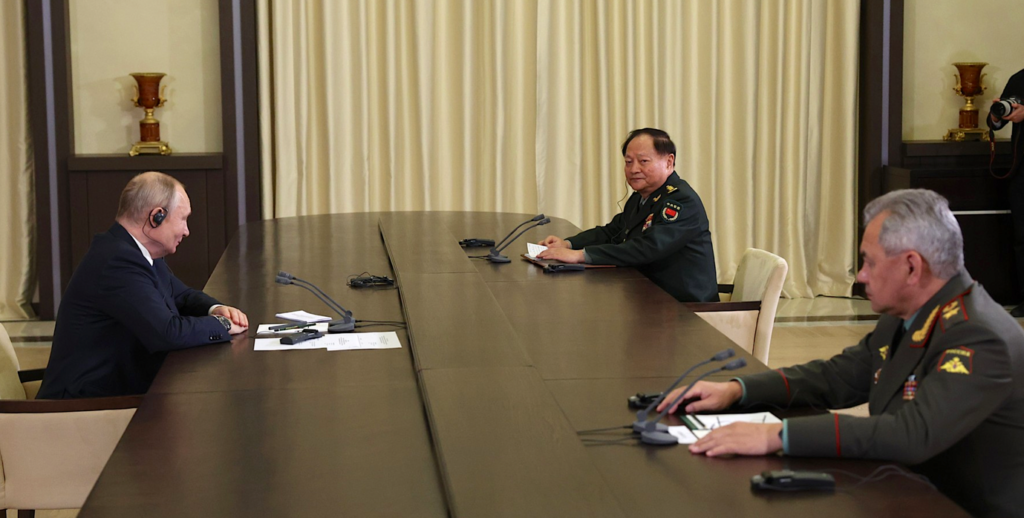
After all, they’ve only seen fictional representations of it in which nobody actually died and the goodies ultimately won. Putin, let’s face it, will not stop stirring up trouble until somebody declares him the undisputed leader of the world. He is a narcissistic fantasist. If anyone really wants to understand the horror of it all, I would suggest a visit to the old Auschwitz death camp in Poland. The Soviet photographer who recorded what the Russians found when they liberated it would speak to nobody for three weeks afterwards and was reduced to tears. Putin, it seems, lacks that’s man’s sensitivity.
Speaking to mark the 75th anniversary of NATO’s founding, Stoltenberg told Kuenssberg that the world is now “much more dangerous, much more unpredictable” and “much more violent” than it was back then. He also warned that Russia, Iran, China and North Korea are increasingly in alignment. Working together they could inflict a lot of damage on a world at peace. Their vision, after all, of a future world that they would find perfect would be a very different sort of place from that envisioned by most of the rest of us, and much more deadly.
Despite Donald Trump raving at NATO members for not spending enough on defence against Russian aggression, those countries claim to be paying what they can. As America’s Business Insider newspaper reports: “We have no other options besides supporting Ukraine and ensuring it wins,” Estonia’s Foreign Minister, Margus Tsahkna told journalists, highlighting that NATO and the West “would pay” heavily should Russia win and expand its ambitions to conquering other neighbours.
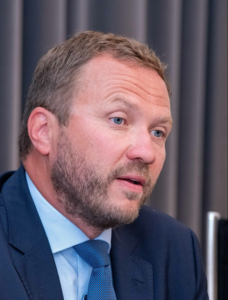
That seems to be Putin’s ambition, after all. Europe certainly isn’t rooting for Trump in the upcoming elections. He has already said that America’s contribution to NATO funding might end unless those European countries most under threat do more, and it’s a view that is gaining traction as the US Presidential election draws near. But NATO’s newest member, Sweden, is already making militaristic noises towards Russia, talking about reinforcing the Baltic Sea island of Gotland, which would significantly strengthen the defence capabilities of Estonia, Latvia, Lithuania, Finland, and Poland. Russia is very annoyed about this development and has made blustering noises in response, although nothing more deadly – so far.
Trump would actually seem to be poorly informed about the NATO countries’ readiness to face a Russian threat. France and Germany are already co-operating in the production of military equipment destined for Ukraine’s war effort, even making the arms on Ukrainian soil. Latvia’s Foreign Minister Krišjānis Kariņš emphasized how the Baltic countries are preparing to deter and counter Russia. “So, in Latvia, and in my neighbours, we go full out,” Kariņš told the newspaper, “We invest in our own defence, budgeting 2.4% this year, it looks like we’re going to hit 3% this year, and we will be going beyond that in the future as well.” If Putin was betting on a rapid surrender by Ukraine and its neighbours when they come under Russian attack, he seems to have badly miscalculated. Similarly, a number of NATO countries are spending 2% or more of their gross domestic product on defence, with the remaining members under increasing pressure to match those figures. In 2023, Poland spent 3.9% of its GDP on defence, which puts its spending (in proportion terms) ahead of the United States with its 3.49% and Greece with 3.01%. Other nations bordering Russia or Belarus have done likewise: Estonia spent 2.73%, Lithuania 2.54%, Latvia 2.07%, with Finland, Romania and Hungary also spending above the 2% threshold.
| FACING A NEW THREAT OF WAR
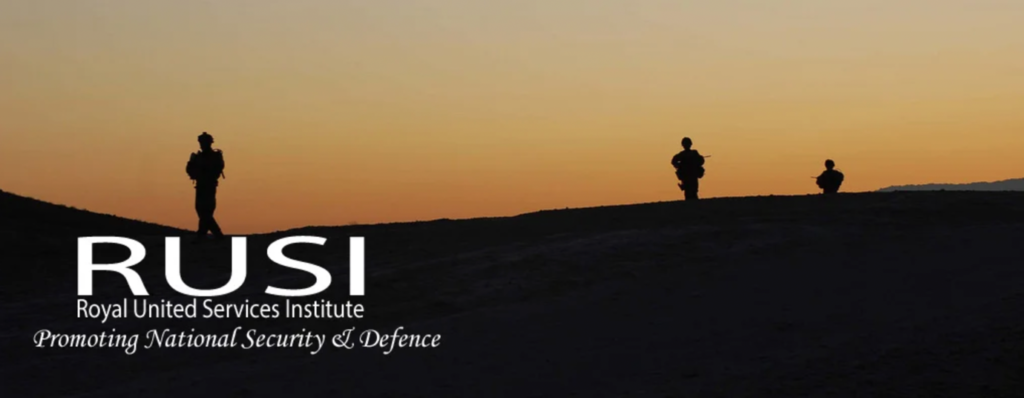
EDIS, however, is something new. It’s unlikely to inspire stirring poetry, but it may make victory more likely against an unpredictable foe with delusions of grandeur. The UK’s United Services Institute (RUSI), for instance, has been urging European Countries to ramp up their preparations for a possible war with Russia – without the support of the United States. Until recently, Russia has been suffering from a shortage of vehicles and weapons, but it is overcoming that through standardisation, which has allowed it to step up production from around 40 long-range missiles per month to more than a hundred, whilst increasing its supplies of artillery shells by getting a hundred or more per month from North Korea and also setting up factories in Iran. According to RUSI: “Russia is settling down for a long war, aiming to grind down Ukraine and exhaust the capacity and will of its Western supporters to supply the vehicles, ammunition and weapons it needs to keep fighting successfully.” Of course, it proves that Putin was lying outlandishly when he claimed his intention was a “small-scale military operation” to remove NAZIs. There weren’t any. Back in the days of the Cold War, Russia’s military spending was far higher, reaching 21% of its GDP by 1985. According to RUSI, “the Kremlin can leverage a formidable coercive information and security apparatus to maintain tight control over any forms of public or political dissent.” What’s more, public opinion seems largely to favour continuing or even stepping up the war, although it’s not clear why the Russian public think that way. Then again, however, there are no opposition newspapers nor are contrary views permitted.
Meanwhile, Europe has failed to make the investments required for increased industrial production capacity and defence spending. Poland is a notable exception here, perhaps because it knows what Russia is capable of.
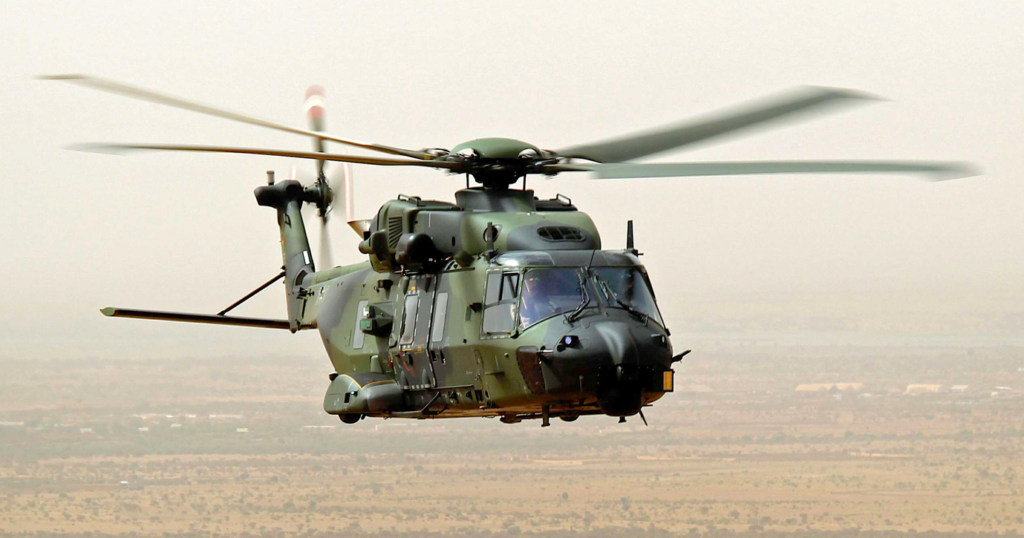
The most obvious example of underspending is Germany, which shortly after the Russian invasion made a public commitment to spend 2% of GDP on defence by 2024, in addition to a one-off investment of €100 billion to revitalise the Bundeswehr’s capabilities. However, only €1.5 billion from the fund had actually been spent by mid-2023, and the defence budget as a whole actually decreased slightly compared to 2022. The UK Defence plan following the Defence Command Paper refresh is already £16.9-billion (€19.7-billion) short of projected planned expenditure over the coming decade. Even so, most of the one-off £5-billion (€5.83-billion) that was granted in 2023 was allocated to long-term nuclear submarine and weapons programmes, with only £1.9 billion (€6.88 billion) of it going towards munitions resupply and purchases for Ukraine over two years. The European Defence Agency’s multinational 155 mm artillery procurement programme is, in the view of RUSI, a solid plan along the required lines, but has been extremely slow to get going when compared with the pace at which Ukrainian requirements are outstripping supply. The EDA programme is also still far from sufficient at its current scale to put Ukraine’s war effort on a sustainable footing for the immediately foreseeable future, let alone replenish Europe’s own defence stockpiles, which have been badly depleted.
And now we have the EU’s latest plan: EDIS. It’s based on that old adage I mentioned earlier: if you want peace, prepare for war. What it really means, of course, is “don’t be caught out”. If you want your country to stay peaceful you must always be ready to deal with those who have contrary ideas. Nobody, it seems, has more contrary ideas than Putin, whose love of going to war is legendary. So is his lack of morals. “Back when he was deputy mayor in St. Petersburg”, says Mark Galeoti’s scary book, “We Need to Talk About Putin”, he reminds us, Putin’s job was to act as a ‘liaison’ – essentially to cut deals with whomever he had to, to keep the city running and the local bigwigs happy. This included powerful crime gangs, especially the Tambovskaya group, an organisation so formidable that its leader, Vladimir Kumarib, became known as the ‘night governor’. They were all big-time crooks, of course, and Putin was their influential facilitator. He was and remains a criminal, even under Russia’s shaky laws. But he’s not going anywhere; Russia is stuck with him; a country ruled by a gangster. We should remember Galleoti’s final conclusions. “Even as we look to a future Russia after Putin,” he writes, “that gives us another reason to talk about Putin. Because there could be another Putin, an even bigger one, waiting in the stairwell.” I used to think Dracula stories were scary but Putin stories are scarier. And they’re true.

